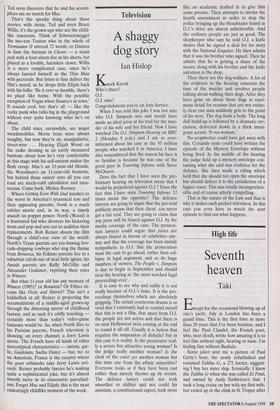Television
A shaggy dog story
Ian Hislop
Who's there?
O.J.
O.J. who?
Congratulations you're on Jury Service. When I was told this joke I was not sure who O.J. Simpson was and would have made an ideal juror at his trial for the mur- der of his wife and her friend. Now I have watched The O.J. Simpson Hearing on BBC 2 (Monday 9 p.m.) and I am as over- informed about his case as the 95 million people who watched it in America. I have also remembered that the reason his face is so familiar is because he was one of the good guys in Towering Inferno with Steve McQueen.
Does the fact that I have seen the pre- liminary hearing on television mean that I would be prejudiced against O.J.? Does the fact that I have seen Towering Inferno 12 times mean the opposite? The defence lawyers are going to argue that the pre-trial publicity means that their client can never get a fair trial. They are going to claim that any juror will be biased against O.J. by the media coverage of the case. The prosecu- tion lawyers could argue that juries are always biased in favour of celebrities any- way and that the coverage has been unduly sympathetic to O.J. But the prosecution want the case to go ahead, rather than col- lapse in legal argument, and so do huge numbers of viewers. The People v. Simpson is due to begin in September and should rival the hearing as 'the most watched legal proceedings ever'. It is easy to see why and oddly it is not really because of O.J.'s fame. It is the pro- ceedings themselves which are absolutely gripping. The actual courtroom drama is so vivid that I constantly had to remind myself that this is not a film, that apart from O.J. the people are not actors and that there is no neat Hollywood twist coming at the end to round it all off. Usually it is fiction that requires the suspension of disbelief but in this case it is reality. Is the prosecutor real- ly a severe but attractive young woman? Is the judge really another woman? Is the clerk of the court yet another woman but this time one from the ethnic minorities? Everyone looks as if they have been cast rather than merely thrown up by events. The defence lawyer could not look smoother or shiftier and nor could his assistant, a constitutional expert, look more like an academic drafted in to give him some gravitas. Their attempts to invoke the fourth amendment in order to stop the police bringing up the bloodstains found in O.J.'s drive are almost unbelievable. And the ordinary people are just as good. The shopkeeper who says he sold O.J. a knife denies that he signed a deal for his story with the National Enquirer. He then admits that it was his brother who signed. Then he admits that he is getting a share of the money along with his brother and the knife salesman in the shop.
Then there are the dog-walkers. A lot of the evidence in the hearing concerns the time of the murder and involves people talking about walking their dogs. After they have gone on about these dogs in enor- mous detail for reasons that are not entire- ly clear one man suddenly gets to the point of his story. The dog finds a body. The long dull build-up is followed by a dramatic rev- elation, delivered slowly in a thick immi- grant accent. 'It vos woman.'
No scriptwriter could have got away with this. Certainly none could have written the episode of the Mystery Envelope without being fired. In the middle of the hearing the judge held up a mystery envelope con- taining what she said was evidence for the defence. She then made a ruling which held that she should not open the envelope but should deliver it to the jurisdiction of a higher court. This was totally incomprehen- sible and of course utterly compelling.
That is the nature of the Law and that is why it makes such perfect television. In this case you even have to watch the next episode to find out what happens.


















































 Previous page
Previous page